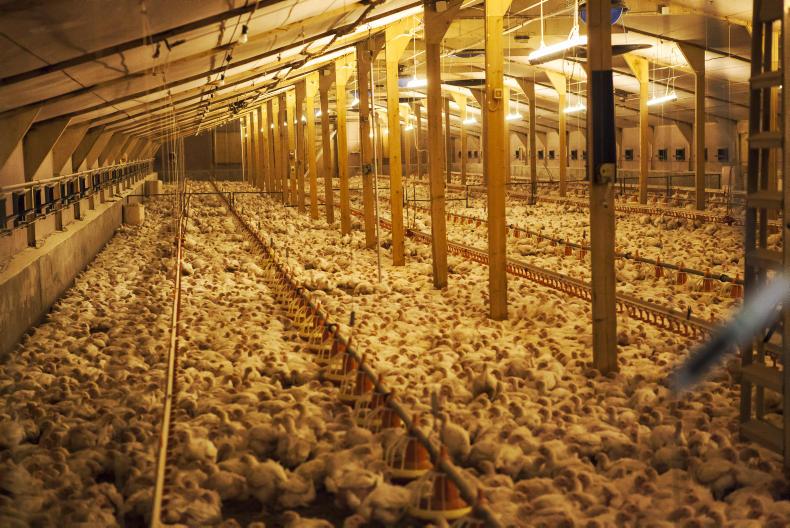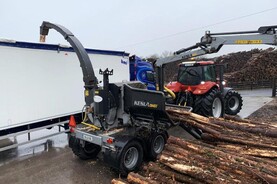Moy Park is to stop processing live birds at its factory in Ballymena and is in negotiations with its farmer suppliers to reduce both the supply and price of broilers.
“Moy Park is proposing to temporarily cease processing live birds at Ballymena due to challenging market conditions, with the view that we will re-open the line in January 2020,” a spokesperson told the Irish Farmers Journal on Wednesday.
The company will still do some further processing and packing at its site in Ballymena. Processing at its other NI-based facilities at Craigavon and Dungannon will remain unchanged. However, to reduce supplies of poultry meat, Moy Park also plans to cut the number of broilers going onto local farms over the coming months.
We are currently working with our colleagues and their representatives, doing our utmost to minimise the impact of this proposal on our excellent workforce
“The North Antrim Hatchery will temporarily cease hatching until November 2019,” the spokesperson confirmed.
Jobs
In terms of job losses, with meat processors in NI having major difficulties in sourcing staff, particularly migrant labour, the impact of scaling back operations at Moy Park could be less severe than otherwise expected.
“We are currently working with our colleagues and their representatives, doing our utmost to minimise the impact of this proposal on our excellent workforce, including offering temporary transfers to other shifts and roles,” the spokesperson said.
Crops
Ongoing negotiations between Moy Park and representatives of its farmer suppliers centre around reducing the number of crops of broilers produced each year and cutting the price paid for birds.
“We will also be working closely with our farming partners throughout the process to manage this temporary reduction in poultry requirement,” the spokesperson said.
Sources indicate that options discussed include reducing the number of crops produced on farms each year from seven to six, and cutting the price by up to 20%. The final outcome of the negotiations will not be known for several weeks. However, suppliers are bracing themselves for a significant reduction in income.
RHI
That comes as poultry farmers are also contending with new cuts to Renewable Heat Incentive (RHI) tariffs, which became law on Monday (1 April).
“It is happening at the worst possible time. We are fighting fires on two fronts, one with RHI and the other with Moy Park,” one local poultry producer said.
For a 99kW boiler, a new RHI tariff of 1.7p/kWh applies for the first 1,314 hours of heat produced each year, with no tariff available thereafter. The new RHI rates apply retrospectively and take effect for individual RHI claimants from the most recent anniversary of scheme accreditation.
According to Jamie Kidney from wood pellet distributor KWh Supply, many RHI claimants will have already used up their 1,314 hours and will receive no RHI payments for the remainder of the year.
This has forced some poultry producers to look at other options for heating sheds, as biomass boilers are too expensive to run without RHI tariffs.
“Many people I have spoken with are pricing gas (LPG) boilers. That is not to say they are installing them at the moment, but it is a very clear indication of what they are planning to do if tariffs don’t change,” Kidney said.
“If the RHI tariff remains where it is now, I believe almost everyone in the poultry industry will revert to fossil fuels.”
Read more
RHI cuts pass through Westminister
Moy Park reports higher profits despite rising feed prices
Moy Park is to stop processing live birds at its factory in Ballymena and is in negotiations with its farmer suppliers to reduce both the supply and price of broilers.
“Moy Park is proposing to temporarily cease processing live birds at Ballymena due to challenging market conditions, with the view that we will re-open the line in January 2020,” a spokesperson told the Irish Farmers Journal on Wednesday.
The company will still do some further processing and packing at its site in Ballymena. Processing at its other NI-based facilities at Craigavon and Dungannon will remain unchanged. However, to reduce supplies of poultry meat, Moy Park also plans to cut the number of broilers going onto local farms over the coming months.
We are currently working with our colleagues and their representatives, doing our utmost to minimise the impact of this proposal on our excellent workforce
“The North Antrim Hatchery will temporarily cease hatching until November 2019,” the spokesperson confirmed.
Jobs
In terms of job losses, with meat processors in NI having major difficulties in sourcing staff, particularly migrant labour, the impact of scaling back operations at Moy Park could be less severe than otherwise expected.
“We are currently working with our colleagues and their representatives, doing our utmost to minimise the impact of this proposal on our excellent workforce, including offering temporary transfers to other shifts and roles,” the spokesperson said.
Crops
Ongoing negotiations between Moy Park and representatives of its farmer suppliers centre around reducing the number of crops of broilers produced each year and cutting the price paid for birds.
“We will also be working closely with our farming partners throughout the process to manage this temporary reduction in poultry requirement,” the spokesperson said.
Sources indicate that options discussed include reducing the number of crops produced on farms each year from seven to six, and cutting the price by up to 20%. The final outcome of the negotiations will not be known for several weeks. However, suppliers are bracing themselves for a significant reduction in income.
RHI
That comes as poultry farmers are also contending with new cuts to Renewable Heat Incentive (RHI) tariffs, which became law on Monday (1 April).
“It is happening at the worst possible time. We are fighting fires on two fronts, one with RHI and the other with Moy Park,” one local poultry producer said.
For a 99kW boiler, a new RHI tariff of 1.7p/kWh applies for the first 1,314 hours of heat produced each year, with no tariff available thereafter. The new RHI rates apply retrospectively and take effect for individual RHI claimants from the most recent anniversary of scheme accreditation.
According to Jamie Kidney from wood pellet distributor KWh Supply, many RHI claimants will have already used up their 1,314 hours and will receive no RHI payments for the remainder of the year.
This has forced some poultry producers to look at other options for heating sheds, as biomass boilers are too expensive to run without RHI tariffs.
“Many people I have spoken with are pricing gas (LPG) boilers. That is not to say they are installing them at the moment, but it is a very clear indication of what they are planning to do if tariffs don’t change,” Kidney said.
“If the RHI tariff remains where it is now, I believe almost everyone in the poultry industry will revert to fossil fuels.”
Read more
RHI cuts pass through Westminister
Moy Park reports higher profits despite rising feed prices






 This is a subscriber-only article
This is a subscriber-only article










SHARING OPTIONS: